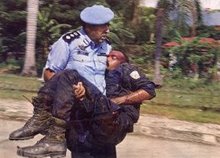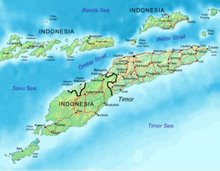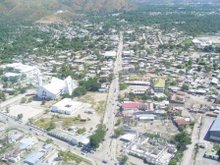O representante das Nações Unidas em Timor-Leste Atul Khare disse que a missão das Nações Unidas em Timor-Leste continua a solicitar ao Major Alfredo para que se submeta à justiça, incluindo todos os que o Tribunal precisar chamar.
Atul Khare falou aos Jornalistas em conferência de imprensa feita no edifício das Nações Unidas em Timor-Leste, há pouco tempo em Caicoli, Dili.
O representante das Nações Unidas em Timor-Leste mais esclarece que a parte judiciária é um órgão supremo, por isso quem quer que seja tem de se submeter à decisão proveniente do Tribunal.
“Sobre o Reinado que disse por sua parte que se entregará à justiça, estou claro que toda a gente tem de se submeter à justiça, incluindo Alfredo Reinado. Pois como anteriormente disse que isto é uma responsabilidade que garante segurança a todo o povo em Timor-Leste, “ disse Atul Khare.
Atul Khare mais explica que sujeitar-se à justiça é parte importante para toda a gente, deste modo não surgirá mais acção violência dentro da nação mas sim atenuará para bem servir a nação.
A cooperação mútua reduz a acção violenta interna. Sendo assim importante que toda a gente servirá melhor a sua terra, “ disse Atul Khare.
Atul Khare também afirma que não é a primeira vez que faz este pedido ao Alfredo Reinado para se submeter à justiça, mas desde o início ele e os seus membros ainda não tiveram esta atitude, em Timor-Leste.
“Eu disse desde que iniciei as minhas funções em Timor-Leste, que Alfredo envolvido em crimes tem de se submeter à justiça,” disse.
Sobre a missão das nações Unidas no futuro, o representante das Nações Unidas em Timor-Leste mais esclarece que por sua parte cooperará com as Nações Unidas em Timor-Leste, participando no processo de desenvolvimento já programado pelas nações unidas com o Governo de Timor-Leste, velando por todos os timorenses. JNSemanário .
Subscrever:
Enviar feedback (Atom)







3 comentários:
Aussies outstay their East Timor welcome
By Loro Horta
DILI - Since the 2006 deployment of Australian peacekeeping troops to East Timor, the Australian Defense Force (ADF) has been confronted with a persistent anti-Australian sentiment from large sections of the population. How did a peacekeeping force that was once welcomed as a national liberator for East Timor from 24 years of brutal Indonesian occupation so quickly find itself unwelcome?
Australia first helped to rescue East Timor in 1999, when it contributed nearly half of the 9,900 troops to the United Nations authorized International Force for East Timor, or INTERFET, which then neutralized the Indonesia-backed paramilitary gangs which raped and pillaged the island after it voted for independence from
Jakarta in a national referendum.
The current ADF contingent was deployed with East Timorese government permission in May 2006, as part of an Australian-led International Stabilization Force (ISF) tasked with containing another spasm of violence that erupted from a schism inside the Timor Leste Defense Force (FDTL). The ISF's main unit, the ANZAC Battle Group, currently consists of about 780 Australian and 170 New Zealand soldiers.
That foreign presence has largely restored stability and was crucial to the successful holding of presidential elections in 2007, which were won by Jose Ramos Horta. Horta told voters on the campaign trail that he supported the continued presence of the Australian-led forces for at least five years, or until the FDTL, which was decimated by the 2006 violence, becomes unified along regional lines and is technically capable enough to take sole responsibility for national security.
The FDTL now receives support from a host of donor countries, including Australia, China, Portugal and Brazil. Opposition candidates, however, had on the 2007 campaign trail called for the ISF to be withdrawn as soon as possible, arguing that the foreign armed presence undermined the new nation's hard-earned sovereignty. Those calls are now increasing in pitch as certain ADF personnel, particularly its young privates, act in ways that undermine the peacekeeping force's image.
According to observers, many ADF personnel have shown an utter lack of respect for local customs and have on several occasions insulted some of the country's highest government officials. The first serious incident took place in October 2006 when the ADF established various checkpoints around the FDTL's headquarters.
Then, FDTL Commander Brigadier General Taur Matan Ruak was prevented at gun point from leaving his own headquarters, with the ADF insisting to search him before he was allowed to leave. He was eventually allowed to pass, but the humiliation at the hands of a teenaged Australian corporal did tremendous damage to the ADF's image among the FDTL's rank and file.
Soon after the standoff with the FDTL's commander, Australian soldiers without cause stripped a Timorese police inspector out of his uniform in the middle of one of Dili's most public places, leaving the officer literally in his underwear. More gravely, they also stand accused on at least one occasion of interrupting the parliamentary process.
In the sub-district of Letfo, where the defense and security commission of the national Parliament was meeting with authorities, an Australian officer who insisted on talking with the local police commander, barged into the meeting. When member of Parliament Davide Ximenes requested that the Australian officer leave the room and wait outside for the meeting to end, the Australian officer reportedly began to scream at the members.
In the end, the situation was resolved when a Brazilian officer dragged the Australian officer out of the meeting room and a Chinese officer calmed the largely built and hot-tempered Ximenes. Following the incident, the head of the United Nations mission to East Timor, Indian diplomat Atul Kare, sent a letter of apology to the national Parliament, while no words of remorse ever came from the ADF or the Australian Embassy.
Other minor issues have added to the ADF's image problem. In October 2006, the ADF drove four armored personnel carriers into the Cristo Rei beach coral reef, a protected marine with unique coral formations, to the outrage of even some Australian non-governmental organizations. Meanwhile, ADF personnel often drive their armored cars at high speed in heavily populated areas, throwing up dust in storefronts and at passerby, say locals. Their reckless behavior has even led to complaints from Australian diplomats based in Dili
The clearest example of the ADF's sometimes reckless behavior was seen in early January. Horta's convoy, made up of more than 10 vehicles, was on its way back to the capital from the western region of the island when it was nearly overrun by two ADF vehicles which failed to stop at the roadside to make way for the presidential convoy. Three Australian citizens were at the time traveling with the president, including an ADF major.
To be sure, the majority of Australian troops in East Timor have done a laudable and professional job. That includes the bravery of Corporal Andrew Wratten, who blew the whistle on the sexual abuse of Timorese young boys by Jordanian peacekeepers in the town of Ocussi. The corporal reportedly had to be evacuated to Australia under armed escort to prevent the Jordanian soldiers from taking revenge.
There are countless other cases of the ADF's honorable conduct, such as the case of Major General Mike Smith, who served in the territory as brigadier and since the crisis of May 2006 greatly assisted the war-torn nation in his capacity as head of AUSAID. The current Australian commander in Timor, Brigadier Peter Hutchison, has been an improvement over his predecessors and shows that with greater discipline these issues can be addressed.
Hutchison's decision to begin purchasing basic foodstuffs and other supplies from local farmers and shops instead of importing them from Australia has given much needed income to the impoverished local population and helped with the ADF's image problem. His tougher disciplinary style has recently reduced cases of ADF reckless driving, public drunkenness and overall rude behavior.
The great majority of Australian military personnel have acted with honor and professionalism while on service in East Timor. However, the arrogant behavior of a small minority has broadly undermined the ADF's image in the eyes of the Timorese population. While the current wave of anti-Australian sentiment is the result of many factors - some of which, to be fair, are beyond the ADF's control - addressing the issues over which they have command is crucial for the continued success of their mission.
Due to its geographical proximity to Australia and the two countries' shared store of natural gas resources, East Timor and its stability will always be of strategic importance to Canberra. As such, Australia should not neglect the way it exercises its hard and soft power inside the newly formed country.
While some of the incidents have been minor and no doubt the result of cultural misunderstandings, they have the potential to create serious tensions between the neighboring nations. As the Australian saying warns, "From little things, big things grow."
Loro Horta is a research associate fellow at the S Rajartnam School of International Studies, Nanyang Technology University, Singapore and a visiting scholar at the Center for International Security Studies, Sydney University, Australia. He formerly worked as an advisor to the Timor-Leste Defense Department.
Timor-Leste: A nation faces chronic, widespread food insecurity
DILI, 4 February 2008 (IRIN) - "It's when you see a child who looks nine but is actually 12 that you realise the extent of malnutrition in Timor Leste," Jean Flueren, the World Food Programme (WFP) country director, told IRIN. "Forty-six percent of children throughout the country are stunted," he said, and 42.6 percent of children under five are underweight, according to the WFP.
When the issue of food insecurity in Timor Leste gets mentioned outside its borders, it is usually about the capacity of the government and the humanitarian community to meet the nutritional needs of tens of thousands of internally displaced people (IDPs) who have still not been able to return home nearly two years since the violence of April and May 2006.
But equally serious is chronic, widespread food insecurity in this country of some 1.1 million people. The poorest in Southeast Asia, it has a per capita income of only US$370 per year, and some 40 percent of the population fall below the national minimum standard of living of $0.55 per capita per day, according to a Food and Agricultural Organization (FAO) and WFP Comprehensive Food Security and Vulnerability Analysis (December 2005/January 2006).
That analysis estimated that 20 percent of the population (some 213,000 people) were food insecure and a further 23 percent (some 244,000) highly vulnerable to becoming food insecure.
Natural disasters, lack of income
According to the WFP and other humanitarian agencies, two factors are making the situation worse.
One is a string of natural disasters, including recent drought, extensive flooding, wind damage and an infestation of locusts in some areas in 2007. (The locusts not only consumed crops but led to some farmers not replanting for fear their efforts would be wasted.)
The other is lack of income. "Food security is an immense problem because people have no purchasing power," the WFP country director told IRIN.
With the twin punches of nature's assault on agriculture, which leaves farmers inadequate goods to sell and inadequate income to plant new crops, and the widespread damage from conflict - with hundreds of thousands of livelihoods lost, markets disrupted and food price hikes - Timorese increasingly lack the means to engage in productive agriculture or the money to buy the essentials of a basic, nutritious diet.
No recent national assessment has been made, but a September 2007 report entitled WFP Dili Emergency Food Security Assessment found 25,000 people at "risk to lives" and needing immediate assistance, and 40,000 at "risk to livelihoods" - this in a city with a population of some 100,000 residents.
"The study found that while 50 percent of the IDPs we were feeding were not food insecure," said Flueren, "half of those not receiving food assistance [the normal Dili residents] were food insecure."
According to the FAO/WFP assessment, "the difference in terms of being at risk to lives or livelihoods between the IDPs and residents is minimal." Flueren said this is countrywide, not just in Dili.
In terms of food assistance to IDPs, the government, WFP and humanitarian agencies have a commendable track record, distributing full rations over two years to more people than are in the camps.
"There are 30,000-35,000 IDPs in Dili," said WFP's Flueren, "but we [with the government and other agencies] have been delivering food to 75,000."
In three Dili camps recently visited by IRIN, we could find no significant complaints about food assistance. "Occasionally" says, Joaquim Da Costa, an IDP and camp manager at the National Hospital camp site, "we have a problem with the food - a bad bag of rice expired."
Ending food aid dependency
The Ministry of Social Solidarity, as a part of its National Recovery Plan, aims to induce IDPs to return home by ending blanket distribution of food from February - reducing to half rations for two months before ending it completely in April.
Some IDPs in Dili told IRIN they were against such a food reduction policy, and one Dili newspaper, Diario Nacional, reported that in one camp IDPs said such cutbacks could result in civil unrest, including strikes and roadblocks.
As an incentive for IDPs to return home, families who agree to go will be provided with two months of rice rations (16 kilos per person).
Better targeted food aid
According to WFP's Flueren, "the Ministry of Social Services has ongoing programmes to provide food assistance as it can" and in the coming months the ministry, with humanitarian agencies, will target food assistance increasingly to particularly vulnerable individuals and communities. Flueren said: "We are now working with the government to develop and design training programmes for food insecure people that help increase livelihoods."
"Over the next few months alternative programmes will have to be put in place that ensure that people who are truly food insecure, such as the elderly, female-headed households and orphans, receive the support they require," said Finn Reske-Nielson, UN humanitarian coordinator and deputy special representative of the Secretary-General.
Reske-Nielson added: "Such alternative programmes would not necessarily just be the distribution of food because we have to move away from the dependence that has been created since the crisis of 2006."
"Food can play a role," he said, "but it could perhaps be in the context of food-for-work, school feeding programmes, but not blanket feeding to 70,000 people each month.
Tackling natural disasters
An important complement to the effort to increasingly target food secure individuals and communities, are efforts to establish mechanisms to effectively warn against and deal with natural disasters. Secretary of State for Social Assistance and Natural Disasters Jacinto Rigoberto Gomes, told IRIN: "We are establishing a disaster information centre to deal with heavy wind, landslides, earthquakes, droughts, flooding and other natural disasters." He said it was being done with the support and advice of the UN Office for the Coordination of Humanitarian Affairs and the UN Development Programme.
Such a project, if it can get the financial support and communications capacity needed, said Gomes, will go a long way in preparing residents for disasters and mitigating their effects. In Timor Leste that will help immeasurably not just in saving lives but in reducing crop and food destruction, thus enhancing food security.
bj/cb
[END]
Obrigado, tradusaun iha ona.
Enviar um comentário